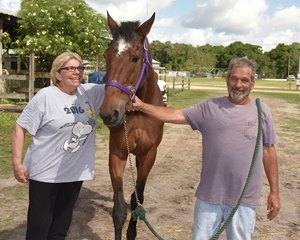Pimental Takes HIWU Penalty, Training Career is Over


John Pimental is done with training racehorses.
A 15-month suspension and a $10,000 fine imposed Jan. 30 by the Horseracing Integrity & Welfare Unit has effectively ended his 50-year training career, Pimental told BloodHorse Feb. 7.
"I've lost my owners; it ruined me really," he said. "I'm scared to get back into the business because I think they'll just be looking for something else."
Pimental ran afoul of the national testing program administered by HIWU under the Horseracing Integrity and Safety Authority umbrella when a then-5-year-old gelding named Golovkin tested positive for methamphetamine. When the trainer was served an Equine Anti-Doping Notice July 28, 2023, his barn at Monmouth Park and truck were searched, which led to the discovery of a container of Thyro-L—the drug levothyroxine and a banned substance under HISA's Anti-Doping and Medication Control program.
Pimental testified at a subsequent hearing that the Thyro-L had been prescribed by his veterinarian for his pony, Richard, who was prone to laminitis and struggled with weight gain. He presented a letter from his veterinarian. Diana Pimental, John's wife, testified that she repackaged the medication into a small container as they were packing to relocate to Tampa Bay Downs and had never taken it out of the truck since October 2022 because the pony no longer required treatment.
For possession of the banned substance, Pimental initially faced a three-year suspension and a $25,000 fine. Pimental did sign an "admission of rule violations" with HIWU Sept. 25 because he just wanted to "end it," he told Thoroughbred Daily News. But then later he withdrew that admission because he was uncomfortable with being associated with a doping charge. Also, HISA/HIWU ombudsman Alan Foreman began working with Pimental at no cost.
A hearing on the merits of Pimental's violation had been scheduled for Feb. 2 but he eventually chose to accept the reduced penalties being proposed and end the case.
The ADMC program does contain provisions that allow for a reduction of penalties based on objective and subjective degrees of fault classified as slight or insignificant, moderate, and significant.
Pimental's degree of objective fault was considered significant because he did admit to knowing levothyroxine was a banned substance and said he took no precautions to be sure he did not have any in his possession when the ADMC program took effect May 22, 2023.
The trainer's penalty got reduced because his subjective degree of fault was lowered to moderate because he had produced a valid prescription, the drug had been used on a non-Covered Horse as defined by the ADMC program, there was no evidence he had acquired the drug after the ADMC program went into effect, and both John and Diana Pimental openly admitted their mistake.
Any sanctions related to Pimental's methamphetamine positive, which was 193 picograms per milliliter, were stayed pending the Federal Trade Commission's consideration of submitted rule revisions related to the ADMC Program, according to Alexa Ravit, HIWU's director of communications and outreach.
"The proposed ADMC rules state that a period of ineligibility for human substances of abuse will not exceed 60 days if HIWU accepts that the positive test was most likely due to inadvertent contamination or human transfer. Pimental's methamphetamine case will be resolved after the FTC acts on the submitted rules," she said.
Pimental's adjudication ran parallel with HIWU action to no longer impose a provisional suspension associated with an initial positive for banned substances that are also known as substances of abuse in humans, specifically cocaine, methamphetamine, methylenedioxymethamphetamine (MDMA), and tetrahydrocannabinol (TCH). If that positive is confirmed by a B sample analysis or if the Covered Person waives a split sample test, then a provisional suspension will be imposed.
"The level in my horse so minute, they must have known it was contamination," Pimental said, noting that he still has no idea about the possible source of the contamination. "It could have happened in a van. From someone saddling a horse, in the gate, or in the test barn. Who knows?"
While the trainer said he understands the rules need to be followed, he sees the handling of the levothyroxine as overreach by HIWU.
"It was in my truck because we had not used it for two years, and it wasn't even for a Covered Horse, it was for my pony," he said from Tampa. "Now I can't even go into a grandstand. I'm doing nothing right now. I don't want to get another job here because we'll be leaving in a couple months."
Diana Pimental is working in the office at Tampa Bay Downs to help make ends meet and start making in-roads toward paying off the fine and legal fees incurred while John's case was handled.
Pimental said he is not sure what he'll do once his suspension is lifted Oct. 27.
"I ponied horses and was outrider before. I could go back to that but Richard is 18 now. He is a good pony and could probably work until he is in his 20s, but I don't want to take a chance," he said. "I'm not sure what I'll do, but I am in a (financial) hole pretty good."
